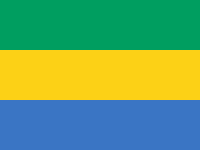 Gabon (pronounced /ɡəˈbɒn/; French pronunciation: [ɡabɔ̃]) is a state in west central Africa sharing borders with Equatorial Guinea to the northwest, Cameroon to the north, and with the Republic of the Congo curving around the east and south. The Gulf of Guinea, an arm of the Atlantic Ocean is to the west. It covers a land area of nearly 270,000 km² and has an estimated population of 1,500,000. Its capital and largest city is Libreville.
Gabon (pronounced /ɡəˈbɒn/; French pronunciation: [ɡabɔ̃]) is a state in west central Africa sharing borders with Equatorial Guinea to the northwest, Cameroon to the north, and with the Republic of the Congo curving around the east and south. The Gulf of Guinea, an arm of the Atlantic Ocean is to the west. It covers a land area of nearly 270,000 km² and has an estimated population of 1,500,000. Its capital and largest city is Libreville.
Since its independence from France on August 17, 1960, Gabon has been ruled by three presidents. In the early 1990s, Gabon introduced a multi-party system and a new democratic constitution that allowed for a more transparent electoral process and reformed many governmental institutions. The small population density together with abundant natural resources and foreign private investment have helped make Gabon one of the most prosperous countries in the region, with the highest HDI in Sub-Saharan Africa.
Artifacts dating from late Paleolithic and early Neolithic times have been found in Gabon, but it is not known when the Bantu speakers who established Gabon’s ethnic composition arrived.Pygmies were probably the original inhabitants. The Portuguese began arriving in the late 15th century and were followed by French, Dutch, and English traders. The Fang started migrating there in the late 18th century. The slave tradedominated commerce in the 18th and much of the 19th century. The French then took control, and Gabon was administered (1843 – 86) with French West Africa.
In 1886 the colony of French Congo was established to include both Gabon and the Congo; in 1910 Gabon became a separate colony within French Equatorial Africa. An overseas territory of France from 1946, it became an autonomous republic within the French Community in 1958 and declared its independence in 1960. Rule by a sole political party was established in the 1960s, but discontent with it led to riots in Libreville in 1989. Legalization of opposition parties enabled new elections in 1990. The country continued to face economic difficulties despite large revenues from petroleum exports.
Gabonese music is lesser-known in comparison with regional giants like the Democratic Republic of the Congo and Cameroon. The country boasts an array of folk styles, as well as pop stars like Patience Dabany and Annie Flore Batchiellilys, a Gabonese singer and renowned live performer. Also known are guitarists like Georges Oyendze, La Rose Mbadou and Sylvain Avara, and the singer Oliver N’Goma. Imported rock and hip hop from the US and UK are popular in Gabon, as are rumba, makossa and soukous. Gabonese folk instruments include the obala, the ngombi, balafon and traditional drums.
Since the 1970s the Gabonese economy has been centered on the oil industry, which has provided it with one of the highest per capita incomes in sub-Saharan Africa and accounts for almost 80% of its export income and 50% of its GDP. Oil wealth, however, led to government corruption, and the population at large has failed to benefit from oil profits. Gabon’s economy also is subject to fluctuating oil prices, and it must contend with diminishing reserves. Decreases in production since the mid-1990s have hurt the economy, although it benefited from oil price increases after 2000. The exploitation of forest products and the mining of manganese, which formed the backbone of the economy until oil became predominant, remain relatively important today. The country’s most significant forest products are okume (a softwood used in making plywood), mahogany, ebony, and rubber. Other minerals extracted are gold, uranium, and iron ore.
The chief products of Gabon’s industrial sector include refined petroleum, chemicals, food and beverages, textiles, and wood products. Despite this economic activity, the majority of Gabonese workers are engaged in subsistence farming, with sugarcane, cassava, plantains, and taro the chief crops. There is also fishing. However, food must be imported to meet the country’s needs. Cocoa, coffee, and palm products are produced for export. Few animals are raised, partly because of the prevalence of the tsetse fly.
Notes from Wikipedia and Answers.com









